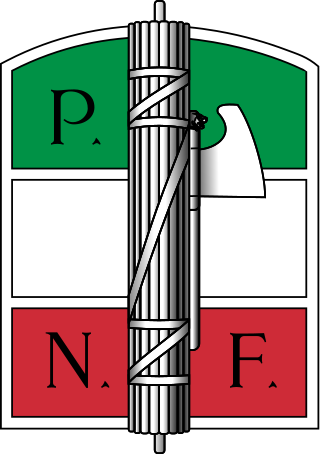Related Research Articles
Fascio is an Italian word literally meaning "a bundle" or "a sheaf", and figuratively "league", and which was used in the late 19th century to refer to political groups of many different orientations. A number of nationalist fasci later evolved into the 20th century Fasci movement, which became known as fascism.
Squadrismo was the movement of squadre d'azione, the fascist militias that were organised outside the authority of the Italian state and led by local leaders called ras. The militia originally consisted of farmers and middle-class people, who created their own defence from revolutionary socialists. Squadrismo became an important asset for the rise of the National Fascist Party, led by Benito Mussolini, and systematically used violence to eliminate any political parties that were opposed to Italian Fascism.

The National Fascist Party was a political party in Italy, created by Benito Mussolini as the political expression of Italian fascism and as a reorganisation of the previous Italian Fasces of Combat. The party ruled the Kingdom of Italy from 1922 when Fascists took power with the March on Rome until the fall of the Fascist regime in 1943, when Mussolini was deposed by the Grand Council of Fascism. It was succeeded, in the territories under the control of the Italian Social Republic, by the Republican Fascist Party, ultimately dissolved at the end of World War II.
Women in Italy refers to females who are from Italy. The legal and social status of Italian women has undergone rapid transformations and changes during the past decades. This includes family laws, the enactment of anti-discrimination measures, and reforms to the penal code.
This is a list of words, terms, concepts, and slogans in the Italian language and Latin language which were specifically used in Fascist Italian monarchy and Italian Social Republic.

Ines Donati was a political activist and a supporter of the first wave of Italy's Fascist movement.
Feminism in Italy originated during the Italian renaissance period, beginning in the late 13th century. Italian writers such as Moderata Fonte, Lucrezia Marinella, and others developed the theoretical ideas behind gender equality. In contrast to feminist movements in France and United Kingdom, early women's rights advocates in Italy emphasized women's education and improvement in social conditions.

Lilia Silvi was an Italian film actress. Silvi was one of several young actresses presented as an Italian equivalent to the Canadian-born Hollywood star Deanna Durbin. She appeared opposite Amedeo Nazzari, the most popular Italian star of the era, in five films.

Seconda B is a 1934 Italian comedy film directed by Goffredo Alessandrini and starring Sergio Tofano, Dina Perbellini and María Denis. It was screened at the Venice Film Festival where it was awarded a prize. It started a trend for "schoolgirl comedies" during the Fascist era, targeted primarily at girls and young women audiences. The title itself refers to a school class. The film is set in the early 1910s.
The Pact of Pacification or Pacification Pact was a peace agreement officially signed by Benito Mussolini, who would later become dictator of Italy, and other leaders of the Fasci with the Italian Socialist Party (PSI) and the General Confederation of Labor (CGL) in Rome on August 2 or 3, 1921. The Pact called for “immediate action to put an end to the threats, assaults, reprisals, acts of vengeance, and personal violence of any description,” by either side for the “mutual respect” of “all economic organizations.” The Italian Futurists, Syndicalists and others favored Mussolini’s peace pact as an attempt at “reconciliation with the Socialists.” Others saw it as a means to form a “grand coalition of new mass parties” to “overthrow the liberal systems,” via parliament or civil society.

The Kingdom of Italy was governed by the National Fascist Party from 1922 to 1943 with Benito Mussolini as prime minister and dictator. The Italian Fascists imposed totalitarian rule and crushed political and intellectual opposition, while promoting economic modernization, traditional social values and a rapprochement with the Roman Catholic Church.
Fasci Femminili (FF) ("Female Groups") was the women's section of the Italian Fascist Party (PNF). The FF was founded in 1919 and disbanded in 1945. It incorporated all the other Fascist organizations for women and girls, which were all formally sections of the FF.
Victoria de Grazia is the Moore Collegiate Professor of History at Columbia University and founding editor of Radical History Review.
Angiola Moretti, was an Italian politician of the National Fascist Party (PNF).
Elisa Majer Rizzioli (1880-1930), was an Italian politician of the National Fascist Party (PNF).
Laura Marani Argnani (1865-1955), was an Italian politician of the National Fascist Party (PNF).
Clara Franceschini, was an Italian politician of the National Fascist Party (PNF).
Baroness Teresita Menzinger Ruata, was an Italian politician of the National Fascist Party (PNF).
Wanda Bruschi Gorjux (1889-1976), was an Italian politician of the National Fascist Party (PNF).

Olga Medici del Vascello (1882-1966), was an Italian politician of the National Fascist Party (PNF).
References
- ↑ WILLSON, P. (2018). GROUP PORTRAIT: THE ISPETTRICI NAZIONALI OF THE ITALIAN FASCIST PARTY, 1937–1943. The Historical Journal, 61(2), 431-451. doi:10.1017/S0018246X17000206
- ↑ de Grazia, V. (1992). How Fascism Ruled Women: Italy, 1922–1945. USA: University of California Press.
- ↑ de Grazia, V. (1992). How Fascism Ruled Women: Italy, 1922–1945. USA: University of California Press.
- ↑ de Grazia, V. (1992). How Fascism Ruled Women: Italy, 1922–1945. USA: University of California Press.